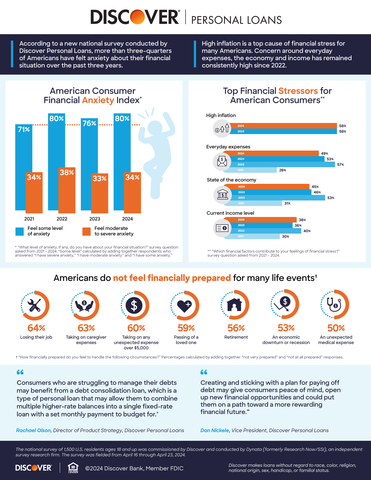Discover Survey: Anxiety and Avoidance are Driving the Financial Lives of Many Americans
Top stressors include inflation, everyday expenses, the economy and debt

American Consumer Financial Anxiety Index a
Year |
Feel Some Level of Anxiety |
Feel Moderate or Severe Anxiety |
2021 |
|
|
2022 |
|
|
2023 |
|
|
2024 |
|
|
a “What level of anxiety, if any, do you have about your financial situation?” survey question asked from 2021 – 2024. “Some level” calculated by adding together respondents who answered “I have severe anxiety,” “I have moderate anxiety” and “I have some anxiety.” |
||
Financial stress is so severe that many Americans appear to be fearful of even looking at their situations. This is especially true among Gen Z with
“For the many Americans experiencing financial stress and anxiety, it may help to write out the reasons why and then address those in small and manageable steps,” said Dan Nickele, vice president, Discover Personal Loans. “Some steps could be building a monthly budget, reviewing expenses to identify opportunities to cut costs and making a plan for potential unexpected expenses like medical costs or home repairs. It may help lower stress just to know that a low fixed interest rate loan could be available if it’s needed in the future for a financial emergency.”
Inflation, expenses, the economy and income are the top drivers of financial stress in 2024
More than half of Americans continue to say high inflation contributes to their feelings of financial stress (
Top Financial Stressors for American Consumers b
Stressor |
2021 | 2022 | 2023 | 2024 |
High Inflation |
N/A |
N/A |
|
|
Everyday Expenses |
|
|
|
|
State of the Economy |
|
|
|
|
Current Income Level |
|
|
|
|
b “Which financial factors contribute to your feelings of financial stress?” survey question asked from 2021 – 2024 |
||||
About one-third (
“Creating and sticking with a plan for paying off debt may give consumers peace of mind, open up new financial opportunities and could put them on a path toward a more rewarding financial future,” adds Nickele.
Americans do not feel financially prepared for many life events
According to the results of the study, many Americans do not feel well equipped to handle a litany of life events that may contribute to feelings of financial strife. For instance, most Americans do not feel financially prepared to lose their job (
Americans do not feel financially prepared to handle c…
Circumstance |
Do not feel prepared |
Losing their job |
|
Taking on caregiver expenses |
|
Taking on any unexpected expense over |
|
The passing of a loved one |
|
Retirement |
|
An economic downturn or recession |
|
An unexpected medical expense |
|
c “How financially prepared do you feel to handle the following circumstances?” Percentages calculated by adding together “not very prepared” and “not at all prepared” responses. |
|
Misconceptions around managing debt vary across generations
According to the survey,
“Consumers across generations and economic situations may not be aware of the financial tools available to help them manage their debts and unexpected expenses,” said Rachael Olson, director of product strategy, Discover Personal Loans. “Those who are struggling with debt could potentially benefit from a type of personal loan called a debt consolidation loan, which may allow them to combine multiple higher-rate balances into a single fixed-rate loan with a set monthly payment to budget for.”
The reasons Americans avoid taking out a personal loan vary across generations. Thirty-three percent of Millennials and
“We encourage consumers to do research to find the best personal loan product that can be tailored to their needs,” adds Olson. “Some of the roadblocks identified by our survey can be addressed by looking for a lender that offers a competitive interest rate, no application fee, no origination fees or closing costs, and flexible repayment terms. We also recommend looking for a lender with a strong history of great customer service, with agents available to answer any questions.”
Discover Personal Loans has many resources available to help consumers learn about managing debt, financing major expenses and reaching their financial goals. A personal loan calculator can help consumers find a loan term that works for their individual situation, and a debt consolidation calculator can help consumers see what they could potentially save if they were to consolidate higher-interest debt with a personal loan.
About the Survey
The national survey of 1,500
About Discover
Discover Financial Services (NYSE: DFS) is a digital banking and payment services company with one of the most recognized brands in
Equal Housing Lender
Discover makes loans without regard to race, color, religion, national origin, sex, handicap, or familial status.
View source version on businesswire.com: https://www.businesswire.com/news/home/20240723820169/en/
Media Contact:
Matt Miller
Discover
mattmiller@discover.com
224-405-0653
@Discover_News
Source: Discover Financial Services







